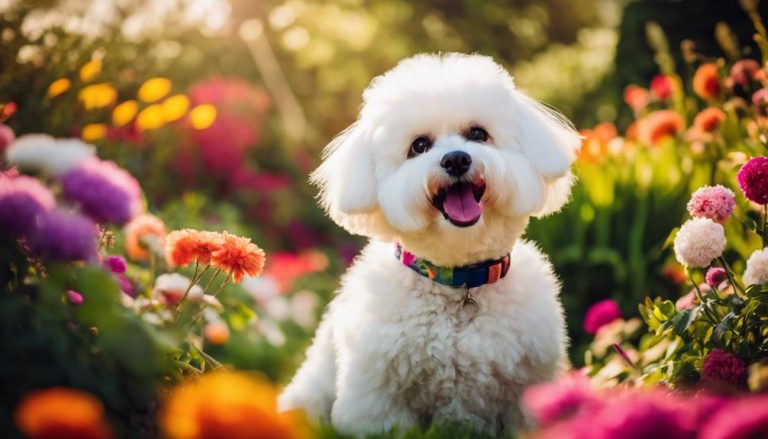Popular Bichon Frise Dog Breed
The Bichon Frise breed, with roots in the Mediterranean and further developed in France, is a preferred choice for many as a small-sized companion dog. This breed is officially recognized by both the American Kennel Club (AKC) and the United Kennel Club (UKC). What sets the Bichon Frise apart is its soft, fluffy coat which varies in color from pure white to different shades of gray. Its coat is unique because it doesn’t shed much, making it a good option for people with allergies.
A Bichon Frise typically weighs between 12 to 18 pounds and has a height of 9.5 to 11.5 inches, making it perfectly suitable for apartment living. These dogs need their coats groomed regularly and should get at least 30 minutes of exercise every day to stay happy and healthy. Common health concerns for the breed include allergies and ear infections, so it’s important to keep up with vet visits and check-ups.
Caring for a Bichon Frise involves understanding their dietary needs, how to train them effectively, and knowing the best ways to keep them active and engaged. With the right care, these dogs can be joyful and lively companions.
Key Takeaways
- Bichon Frises are small, allergy-friendly dogs with fluffy coats.
- They need daily exercise and grooming for their health.
- Socialization and training help them become well-adjusted pets.
Quick Facts
The Bichon Frise is a charming small dog that typically lives between 10 to 15 years. It was a favorite among European royals because of its friendly nature, manageable size, and easy-going personality. These qualities make it a perfect pet for many homes. The breed came from the Mediterranean and was later developed in France, contributing to its healthy constitution and sociable personality.
A Bichon Frise usually weighs about 12 to 18 pounds and stands around 9.5 to 11.5 inches tall at the shoulder. They have a curly, hypoallergenic coat that needs regular grooming to keep its unique look. This breed loves to play and enjoys being around people. Their size and personality mean they can happily live in apartments or bigger homes as long as they get enough exercise and mental engagement.
For anyone thinking about getting a Bichon Frise, it’s important to know about their specific needs. This includes their diet, how often they need grooming, and the importance of early socialization and training. Doing this ensures you have a content and well-behaved dog.
Overview
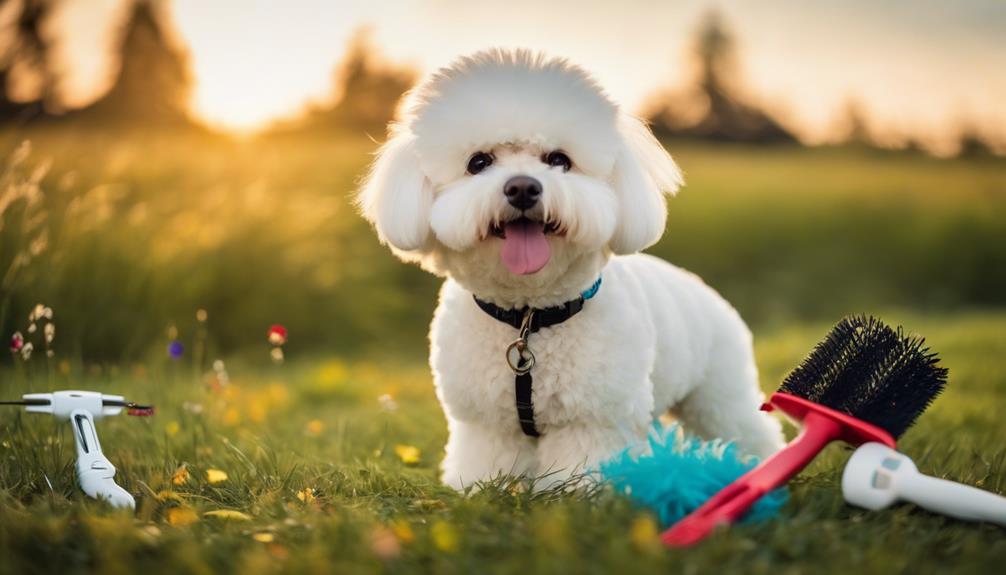
The Bichon Frise originated in the Mediterranean before France made its mark on the breed, shaping it into the cheerful and affectionate companion we know today. This small dog breed, famous for its curly coat that doesn’t shed much, making it a great choice for people with allergies, is known for being incredibly friendly and smart. The American Kennel Club (AKC) and the United Kennel Club (UKC) both recognize the Bichon Frise as a companion dog due to its loving nature and how well it gets along with humans.
These dogs are on the smaller side, weighing between 7-12 lbs, and have a height of about 12 inches at the shoulder. Despite their compact size, they are muscular and active, able to participate in various activities. They’re also known for living a relatively long life, typically 12-15 years, with proper care, indicating they’re generally healthy dogs.
Caring for a Bichon Frise mainly involves keeping up with their coat, which needs regular grooming, baths, and cuts to stay clean and healthy. Their coats can be white, buff, cream, apricot, or gray, adding to their charm. This breed is not just a pretty face; its hypoallergenic coat and loving personality make it a fantastic pet for a wide range of families.
Cloud-Like Fluffy Coat
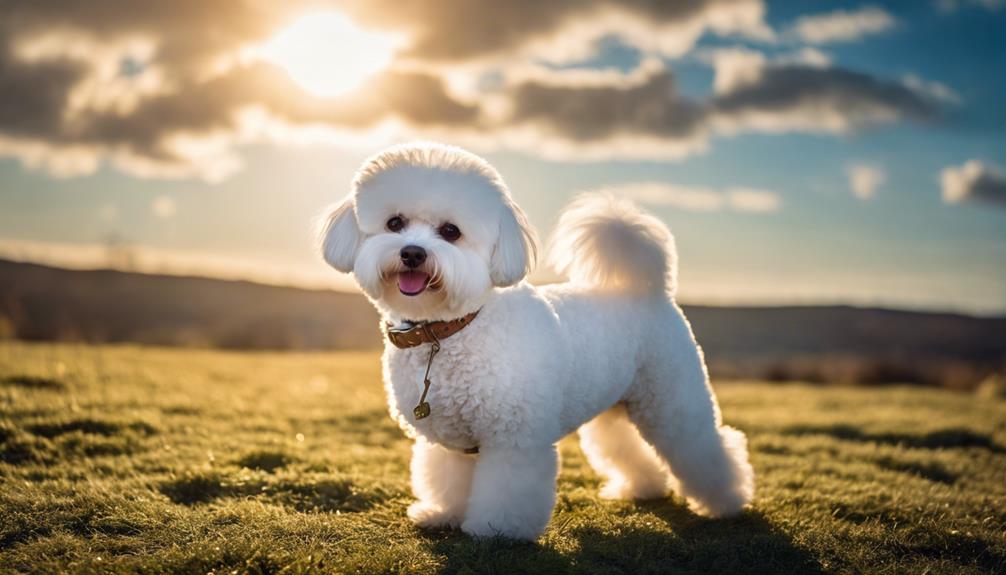
Reflecting on the Bichon Frise’s distinctive look, its cloud-like, fluffy coat stands out for its softness and bright white color. This coat is a key reason for the breed’s appeal, especially to those with allergies, as it sheds very little. To keep it in top shape, regular grooming is essential to avoid tangles and maintain its health.
| Feature | Detail |
|---|---|
| Color Variants | While white is the most common, you can find Bichons in buff, cream, apricot, or gray. |
| Hypoallergenic | Yes, their low shedding makes them great for people with allergies. |
| Grooming Needs | Daily grooming is crucial to keep their coat fluffy and mat-free. |
| Professional Care | Getting help from a groomer now and then keeps their coat looking its best. |
| Texture & Appeal | Soft and cuddly, their coat adds to their charming appearance. |
Caring for a Bichon Frise requires a commitment to daily brushing and regular professional grooming. This attention to grooming not only keeps them looking adorable but also ensures they stay comfortable and healthy.
Origin: Mediterranean Region
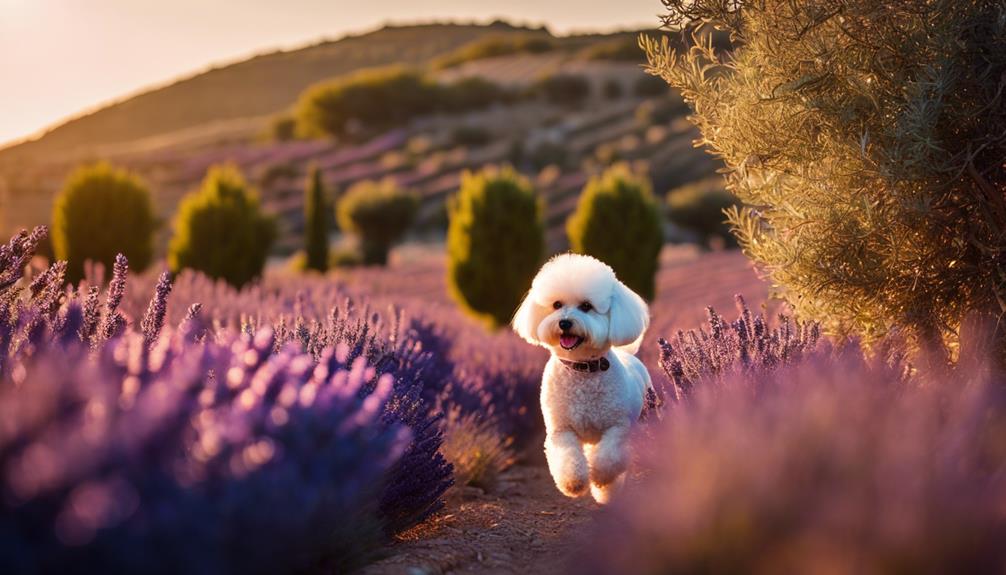
The Bichon Frise, hailing from the Mediterranean region, offers a rich narrative in the evolution of dog breeds. This journey from ancient seafarers to today’s cherished companions highlights three critical areas:
- Ancient Maritime Roots: The breed’s story begins in the Mediterranean, spreading far and wide with sailors and traders.
- Breed Evolution: Over centuries, the Bichon Frise has been honed and refined across various lands, becoming the dog we love today.
- Historical Impact: Throughout time, the Bichon Frise has played significant roles in different cultures, showcasing its versatility and charm.
These points paint a full picture of the Bichon Frise’s past and present, showcasing why it remains a favorite.
Ancient Maritime Roots
The Bichon Frise breed has its roots deep in the Mediterranean, particularly from Tenerife in the Canary Islands. Known for their distinct white, curly coats, these small dogs weigh around 10-18 pounds and stand about 10-12 inches tall. Their friendly nature, coupled with intelligence and playfulness, makes them great companions. However, they do need regular grooming to keep their coats in tip-top shape and are known to have issues like allergies, ear infections, and dental problems. The challenging Mediterranean climate from where they originate has made them quite adaptable and resilient pets.
Reflecting on their origin, it’s clear that the Bichon Frise was bred to be both a joy and a companion, thriving in various environments thanks to their versatile nature. This shows in their ability to connect with humans, making them not just pets, but part of the family. Their care needs, while manageable, remind us of the importance of regular vet check-ups to keep them healthy and happy.
Breed Evolution Journey
The Bichon Frise breed, with roots in the diverse Mediterranean region, has a history of adapting to various environments. This small dog, weighing between 10-18 pounds and standing at 10-12 inches tall, is known for its distinctive white, fluffy coat. Regular grooming is essential to keep their coat healthy and looking its best.
These dogs are not only charming and intelligent but also friendly and playful, making them popular pets.
However, owning a Bichon Frise requires attention to their health needs. They are prone to allergies, ear infections, and dental problems. It’s important for owners to stay vigilant and provide proper care to avoid these issues.
Notable Historical Influence
The Bichon Frise is a small dog breed with roots in the Mediterranean, specifically believed to have originated from Tenerife in the Canary Islands. These dogs are renowned for their white, fluffy coats which require frequent grooming, and they stand out for their friendly, playful, and smart nature. Historically, owning a Bichon Frise was a sign of wealth and elegance. This was not just because they were adorable pets but also because they symbolized status. Their health, while generally good, did bring attention to the need for regular vet visits, highlighting the growing awareness of pet care in past societies.
Owing to their lovable personality and distinctive appearance, Bichon Frises were more than just companions; they were a luxury. Their presence in a household indicated a certain level of luxury and taste, signifying more than just the ability to care for an animal but to indulge in the finer things. The breed’s susceptibility to certain health issues like allergies and dental problems also meant that their owners were invested in their well-being, a concept that has evolved but remains significant today.
Small Stature
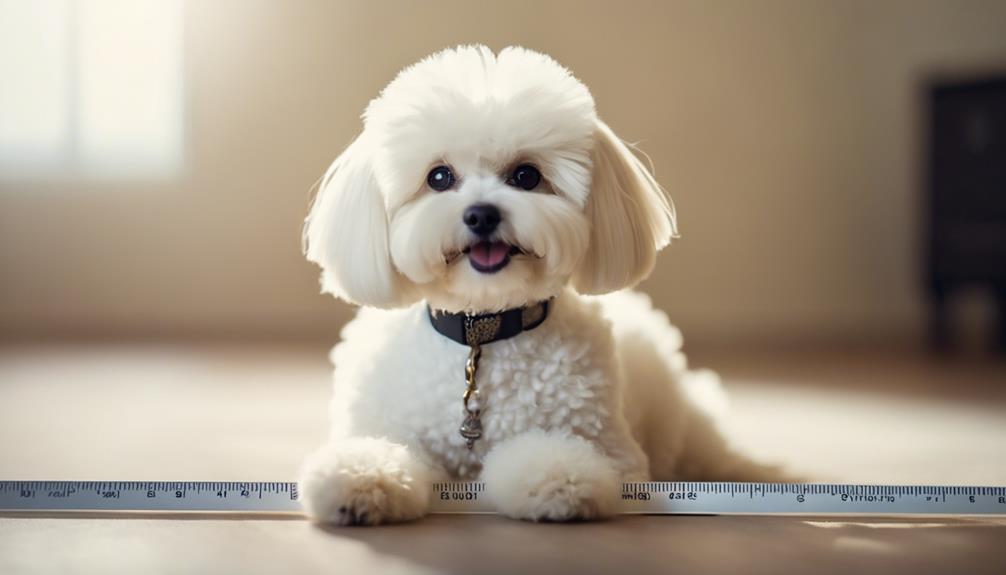
The Bichon Frise breed, despite its small size, comes with a set of needs that potential owners should be aware of. These dogs are well-suited for apartment living because of their size and adaptable nature. Their energy levels mean they require regular exercise to stay healthy and happy.
Their grooming needs are also something to consider. The Bichon Frise’s thick, curly coat requires regular maintenance to avoid mats and keep them looking their best.
For anyone thinking of getting a Bichon Frise, understanding these aspects is key to providing a loving and suitable home for these delightful dogs.
Ideal Apartment Companions
Bichon Frise dogs are perfect for apartment living because of their small size. They are between 9.5-11.5 inches tall and weigh 12-18 pounds, making them easy to fit in smaller spaces. These dogs are known for their playful nature and ability to adapt to indoor living. They bring a lot of energy to your home but they still do well in apartments.
It’s key to keep them active and mentally stimulated, though. Since they are full of life, making sure they get enough exercise and activities to keep their minds sharp is important. This helps them stay happy and healthy in a compact living environment.
Exercise Needs Explained
Bichon Frises, despite their small size, need at least 30 minutes of exercise every day. This is crucial for their health and happiness. While they’re a great fit for apartment living, they still need their daily dose of physical activity. Regular exercise helps prevent weight gain, keeps their muscles strong, and supports their overall health.
For these dogs, daily walks, playtime, and engaging activities are key. Bichon Frises are energetic and love spending time with their owners. Having a routine exercise plan is vital to keep them in good shape and mentally sharp, whether they live in an apartment or not.
Grooming Compact Coats
Keeping a Bichon Frise’s compact and curly coat in top condition requires daily grooming efforts. This includes brushing, bathing, and the occasional trim to avoid mats and keep their fur looking its best. Grooming isn’t just about looks; it’s crucial for their health too. Owners have the freedom to choose the grooming style that works best for both the dog’s appearance and their lifestyle.
Regular care for the eyes is also vital to prevent the stains caused by tear discharge, a common issue in white-coated breeds like the Bichon Frise. Setting up a routine for eye cleaning and consulting a vet for any unusual discharge helps keep their coat and eyes healthy.
Socializing Small Breeds
After talking about how to take care of the Bichon Frise’s coat, it’s crucial to focus on early socialization for small dogs to help them become confident and well-behaved. Small breeds like the Bichon Frise really need to start meeting new people, animals, and exploring different places while they’re young. This can help prevent them from becoming scared or aggressive, which is common in dogs that don’t get out much.
Getting them used to new situations early on means they’re better at handling changes, aren’t as nervous around new people, and are generally more friendly and easygoing.
Making sure your small dog, such as a Bichon Frise, starts socializing early is key to avoiding behavior issues, leading to a dog that’s good with people and other animals.
Health Overview
Bichon Frises are small dogs, usually weighing 12-18 pounds and standing 9.5-11.5 inches tall. They typically live for 14-15 years. It’s crucial to pay attention to their health from an early age due to their size. These dogs are known for being friendly and easy to get along with, but they can face some health challenges.
Allergies, ear infections, and dental issues are common problems for Bichon Frises. These issues can severely affect their life if not addressed properly. Regular grooming and careful attention to their health are key to keeping them happy. Training them to manage stress can also help prevent stress-related behaviors.
To keep a Bichon Frise healthy, watch out for signs of these health issues and get them to a vet quickly when needed. Proper care and early intervention can make a big difference in their quality of life.
Charming and Cheerful Disposition
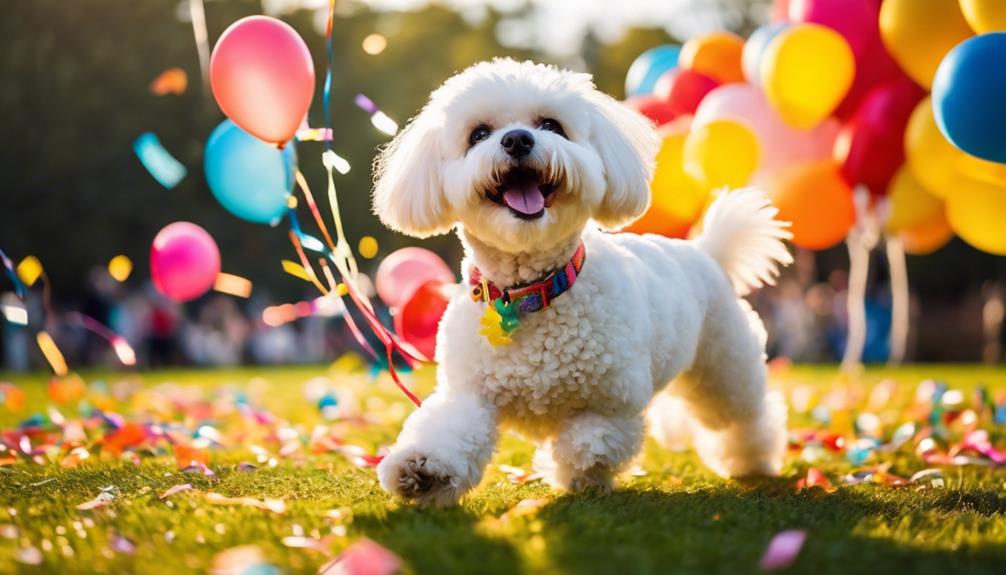
The endearing personality and constant joy Bichon Frises bring to their families go far beyond just their outward appearance. It’s woven into their very nature, making them perfect companions. Here’s a closer look at what makes these dogs so special:
- Personality Traits: These dogs are known for their naturally friendly and loving character. Their personality is a big reason they make such great pets.
- Social Behavior: Bichon Frises love being around people and other pets. They’re known for their ability to get along well in almost any setting, showcasing their extroverted nature.
- Emotional Intelligence: These dogs have a remarkable ability to pick up on their owners’ feelings. This sensitivity to emotion makes them excellent companions, as they often offer comfort when it’s needed most.
Understanding these aspects helps explain why Bichon Frises are such beloved pets.
Personality Traits
Bichon Frises are known for their lovable personality and high spirits, making them great friends. They are smart and keen to learn, which makes them adaptable to different homes. These dogs are super friendly and love being around people, making them perfect for families with kids. They bring energy and fun into a household, keeping everyone entertained.
But, it’s important for owners to know they don’t like being alone for too long and might bark a lot if they are. They need regular interaction and companionship to stay happy.
Social Behaviors
Bichon Frises are known for their cheerful and friendly personality, making them perfect companions for many families. They love being around people and get along well with kids and other animals. These dogs have a natural desire to be loved and can become the life of any gathering. However, they don’t like being left alone and can get anxious without regular company. This anxiety can make them bark more than usual.
To help them feel secure and reduce barking, it’s essential to train them with positive reinforcement. This means rewarding their good behavior, which helps them learn in a supportive and loving way. Bichon Frises are sensitive dogs that respond well to kindness in training. With the right approach, they can adapt well to various social situations and be delightful pets.
Emotional Intelligence
Bichon Frises are known for their emotional intelligence, showcasing a friendly and joyful nature. This trait helps them build strong connections with families and individuals alike. They are great at adjusting to different settings and are very friendly with kids and other animals. Their eagerness to please and their affectionate interactions highlight their loyalty and love for their human friends. However, their strong attachment to their owners can sometimes cause separation anxiety. This issue can be lessened by ensuring they have plenty of human contact.
Training from an early age is key to developing their emotional smarts. Bichon Frises respond well to positive feedback, making them quick learners who are good at picking up on their owners’ feelings. This makes them not just pets, but compassionate members of the family.
Adaptability Skills
Bichon Frises are known for their endearing personality and ability to adapt to various living conditions. These dogs are perfect for both quiet homes and lively families because of their friendly nature. They get along well with kids and other animals, making them a great addition to any household. Their intelligence and eagerness to learn make training a breeze.
However, Bichon Frises do not like being left alone for long periods. They may become anxious or bark a lot if they don’t get enough human interaction. To keep their spirits up and ensure they remain adaptable, it’s crucial to give them daily exercise and start positive reinforcement training early on. This approach helps with their emotional health and boosts their ability to adjust to new situations.
Playfulness Levels
Bichon Frises are known for their energetic and happy nature, making them perfect pets for families. Their playful behavior is a key part of their appeal, rooted in their smart and friendly personality. These dogs love to be around people and need to keep their minds active and engaged.
Their fondness for toys and games is a clear sign of their lively spirit. Bichon Frises are more than just fun; they’re also a source of happiness and laughter in any home. Their knack for staying playful and cheerful makes them ideal companions for those looking for a joyful and affectionate pet.
Longevity and Common Ailments
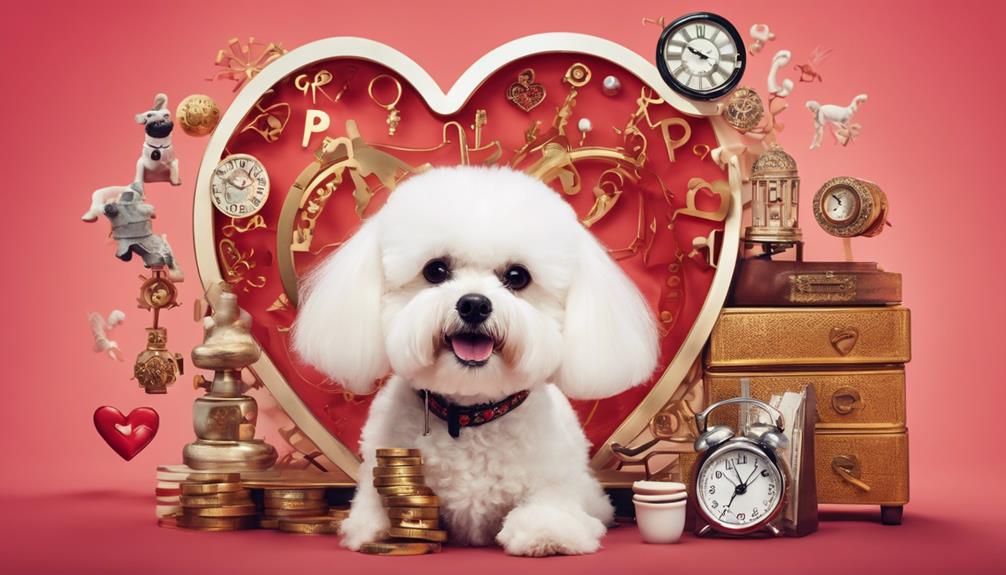
Understanding the health and lifespan of Bichon Frise dogs is crucial for their well-being. Here are the key points to consider:
- Lifespan Insights: Bichon Frises typically enjoy a life of 12-15 years. Their longevity can be influenced by genetics, diet, and exercise.
- Common Health Issues: These dogs often face issues like allergies, ear infections, and dental problems. Knowing these can help in early detection and treatment.
- Preventive Care Tips: Regular grooming, proper dental hygiene, and consistent vet check-ups are essential in preventing health issues. These practices can lead to a healthier life for your Bichon Frise.
This information is aimed at helping Bichon Frise owners provide the best care for their pets, ensuring they live long, happy lives.
Lifespan Insights
Bichon Frises are known for their longevity, often living between 12 to 15 years. Some can even live longer if they’re well taken care of. Keeping your Bichon Frise healthy is key to ensuring they live a long, happy life. Regular vet check-ups are crucial for catching and treating any health issues early on.
A good diet, plenty of exercises, proper grooming, and dental care are all essential. Keeping an eye on their weight and making sure they eat right can help prevent health problems. Quick action on any health issues they may face is also important for their quality of life and longevity.
Common Health Issues
Bichon Frises are known for their joyful demeanor and fluffy coats, but they do face some health challenges. These include skin allergies, ear infections, and dental issues. These small dogs typically live between 12 to 15 years, and maintaining their health is key to ensuring they live a full life.
Skin allergies in Bichon Frises often result in itchiness and discomfort, which might require special diets or treatments. Since they have floppy ears, they’re prone to ear infections that need regular cleaning to avoid problems. Good dental hygiene is crucial too, as ignoring it can lead to serious dental conditions.
To keep a Bichon Frise healthy and happy, it’s essential to have regular vet check-ups. Proper grooming and dental care can prevent many of these issues. A well-cared-for Bichon Frise can enjoy a long, content life with their family.
Preventive Care Tips
For the health and longevity of Bichon Frises, taking preventive steps is key. Regular visits to the vet can catch health issues early, helping your dog live longer. A good diet and regular exercise are vital to keep them from getting overweight, which can cause a lot of problems.
Taking care of their teeth is also important. You should brush their teeth often and get them cleaned by a professional to prevent gum disease. Keeping up with their vaccinations, protecting them from parasites, and giving them heartworm medication will help keep them safe from common diseases.
Hiring a groomer, creating a safe living space, and providing plenty of physical and mental activities, along with a healthy diet, are all part of keeping them happy and well.
Grooming Essentials
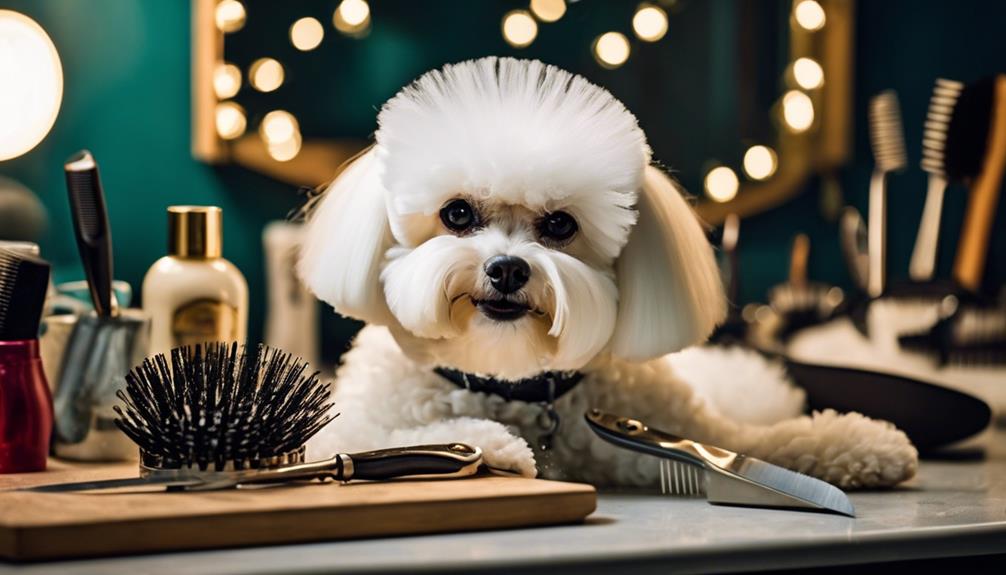
When grooming a Bichon Frise, it’s crucial to focus on their unique coat and overall health. This involves:
- Understanding Coat Care: The curly coat of a Bichon Frise is prone to matting if not properly cared for. Regular maintenance keeps their coat fluffy and attractive.
- Brushing Techniques: Using the right brush and technique is important to reduce shedding and spread the dog’s natural oils throughout its coat, keeping it healthy.
- Bath Routine: Bichons have sensitive skin, so it’s important to bathe them with products that won’t irritate them while maintaining the natural fluffiness of their coat.
Proper grooming ensures your Bichon Frise not only looks great but stays healthy.
Coat Care Basics
Caring for a Bichon Frise’s coat requires daily effort, including combing, trimming, and bathing. These steps are crucial to prevent knots and ensure the coat remains healthy. The unique and fluffy coat of the Bichon Frise demands careful attention to keep it looking its best. Regular grooming not only helps maintain cleanliness and smoothness but also allows for the early detection of skin conditions or pests that could harm your dog.
Owners have the choice between simpler grooming styles like the puppy cut and the more detailed show cut, depending on their preference and their dog’s lifestyle. It’s also important to take care of the area around the eyes to avoid tear stains, which are more visible on white coats. A consistent routine for cleaning the eyes, along with checking in with a vet for any unusual signs, is key to keeping your Bichon Frise looking bright and alert.
Brushing Techniques
Regular brushing is key for a Bichon Frise’s coat health, preventing knots and keeping their fur looking its best. Using a slicker brush or fine-toothed comb helps remove tangles without causing discomfort. Starting these grooming habits early on makes the process easier for both you and your pet. Focus on areas like behind the ears, under the legs, and around the tail where mats often form.
Though you can do a lot at home, taking your Bichon Frise for a professional grooming every 4-6 weeks is good for their coat’s health. This keeps their unique, curly fur in perfect shape and ensures they always look their best.
Bath Time Tips
Keeping a Bichon Frise healthy means giving them baths every 3 to 4 weeks. It’s best to use a shampoo that’s kind to their skin to avoid any irritation. Before you start the bath, make sure to brush them well. This helps untangle their fur and makes the bathing process easier. Use a sensitive skin shampoo to keep them comfortable, and make sure to rinse all the shampoo out to avoid any itchiness.
After the bath, drying them thoroughly is key. This step prevents skin problems and keeps their coat fluffy, which is a signature look for the Bichon Frise. Regular grooming doesn’t just keep them clean; it also maintains their unique look.
Nail Clipping Advice
Regular nail trimming is vital for Bichon Frises to keep them comfortable and prevent their nails from growing too long. Long nails can cause pain and even alter the way these dogs walk. It’s important to use sharp clippers that are suitable for the size and breed to avoid splitting or crushing their nails, which could hurt their sensitive paws.
Owners should be careful not to cut the quick, a blood vessel inside the nail, to avoid causing pain or bleeding. If you’re not sure how to trim your dog’s nails properly, asking a professional groomer or a vet for help is a good idea. Making nail trimming a positive experience with lots of praise and treats can help your Bichon Frise view it as a fun bonding activity rather than something to fear.
Ear Cleaning Methods
Keeping your Bichon Frise’s ears clean is essential for preventing infections and other ear problems. Regular ear cleaning is a key part of your dog’s grooming routine that helps keep their ears healthy.
Use a vet-recommended ear cleaning solution and be gentle. It’s important not to use cotton swabs or to insert anything deep into the ear canal, as this could hurt your dog.
Check your Bichon Frise’s ears every week for redness, discharge, or bad smells, which could be signs of infection. Cleaning their ears the right way helps stop issues like infections and wax buildup, making life better and more comfortable for your dog.
Dietary Needs Overview

As we shift our focus to the nutritional needs of the Bichon Frise, it’s important to understand what keeps them healthy and energetic. Our conversation will cover three key areas:
- Essentials of a balanced diet
- Special food requirements
- Recommendations for feeding times
Together, these topics provide a solid foundation for feeding a Bichon Frise in a way that supports their health and happiness.
A balanced diet is crucial for maintaining a Bichon Frise’s health. This means meals that are rich in proteins, carbohydrates, fats, vitamins, and minerals. It’s all about finding the right mix that suits their active lifestyle. Special dietary needs may arise due to allergies or sensitivities common in this breed. For example, some may require grain-free food or specific protein sources.
When it comes to feeding schedules, consistency is key. Regularly spaced meals help regulate their metabolism and prevent overeating. Whether you’re dealing with a puppy or an adult dog, sticking to a routine makes a big difference in their overall well-being.
Understanding these aspects of a Bichon Frise’s diet is not just about feeding them. It’s about ensuring they lead a fulfilling life, full of play and good health. With the right food and feeding practices, you can help your Bichon Frise thrive.
Balanced Nutrition Essentials
Providing Bichon Frises with a nutritious diet is key to their health and happiness. It’s important to have a regular feeding routine that meets their specific dietary requirements.
For young Bichon Frise puppies, more frequent meals support their growth and development needs. In contrast, adult dogs do well with smaller meals throughout the day to keep their weight in check and avoid stomach issues. Keeping an eye on how many treats they get is also important to maintain a balanced diet.
If you have a Bichon Frise with special dietary needs or health concerns, talking to a vet for tailored diet advice is a smart move. This ensures your dog gets the right nutrition tailored to their individual health needs.
Special Dietary Considerations
Bichon Frises might need special diets due to their unique health requirements, including issues like diabetes or allergies. It’s crucial to feed them high-quality food in small, consistent portions to avoid weight problems.
When a Bichon Frise has health concerns such as diabetes or allergies, a diet tailored to their specific needs becomes necessary. This should be developed with a vet’s help, who can also recommend how often and how much to feed them, particularly important for growing puppies.
Keeping an eye on how many treats they get is key to keeping them healthy. Any changes to their diet, tailored to their individual health requirements, should always be made after consulting with a vet. This ensures their dietary needs are met without making any health issues worse.
Feeding Schedule Tips
Feeding your Bichon Frise the right way is key to keeping them happy and healthy. These dogs do best with several small meals throughout the day, helping them stay energetic without putting on extra pounds. It’s important to watch how much you’re feeding them, including treats, to avoid obesity.
For Bichon Frises with health issues like diabetes or food allergies, customized diets are a must. Getting advice from your vet on what and how much to feed your dog is essential. They can help set up a feeding schedule, figure out the right portion sizes, and adjust the diet as needed.
Choosing high-quality dog food is vital to meet your Bichon Frise’s nutritional needs. This ensures they live a long and lively life. Keeping up with a good feeding routine is crucial for your dog’s well-being.
Frequently Asked Questions
Do Bichon Frise Dogs Bark a Lot?
- Not naturally excessive barkers, but sensitivity can increase barking.
- Training reduces unwanted barking, creating a quiet home.
- Noise sensitivity varies; training is key for calm.
Are Bichon Frise a Good Dog to Have?
- Bichon Frise suits all family types.
- Their coat is great for allergy sufferers.
- Perfect for social households.
Are Bichon Frise High Maintenance?
- Bichon Frise requires daily grooming to avoid tangles.
- Regular vet checks and baths keep them healthy.
- Their coat demands professional grooming frequently.
Are Bichons Smart Dogs?
- Bichons are highly intelligent dogs.
- They excel in social learning and training.
- Their adaptability makes training easier.

